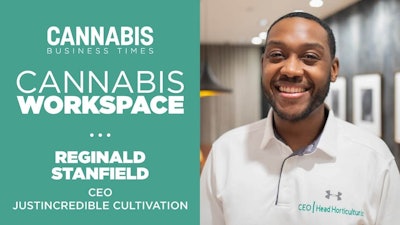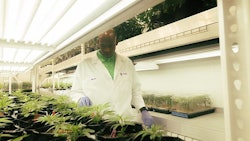
Indoor, outdoor, greenhouse or a combination: “Indoor is my style. More control, less problems and better-looking bud. If I could grow in the triangle, then I’d pick outside, hands down. But here in Massachusetts, inside.”
Can you share a bit of your background and how you and your company got to the present day?
A self-made entrepreneur, [I] built [my] first business from the ground up. [I] graduated from Bowie State University with a BS in Finance and Money Banking. [I] started [my] first company, Masters of Mixology, LLP (M2), a private event bartender’s service. Raised on a farm in North Carolina, [I have] 20-plus years in agriculture.
[I have] always been an avid cannabis consumer and when Massachusetts legalized for adult use in 2016, [I] saw an opportunity to get in on the ground floor. The founding members and I moved to Massachusetts in 2017 and began building the grow facility.
While we were building, we slept in an RV. Imagine three men and one woman in an RV for 9 months, working day in and day out, 7 days a week to design and create what is now the home of the first Black-owned, woman-owned and veteran-owned cannabis cultivator on the East Coast.
What tool or software in your cultivation space can you not live without?
There aren’t any tools I can’t live without, but I can’t live without good employees and people who believe in me.
What purchase of $100 or less has most positively impacted your business in the last six months?
It’s really difficult to quantify that in $100 or less because everything we do here costs a lot of money; however, what costs literally nothing for me is talking with my employees and listening to their struggles about everyday life. There are those struggles they’re going through and sometimes those can be compounded by the pandemic. When I was the CEO and the head horticulturalist working up to 20 hours a day, I couldn’t be the sounding board to my employees that I can be now.
What cultivation technique are you most interested in right now, and what are you actively studying (the most)?
What I’m into is chronocuring, when really cold temperatures are used for the curing. I’m interested in flash-frozen extraction. I’m interested in concentrating more on the cannabinoid and terpene profiles because of the effect they have on the body versus focusing on strains with high THC. We need more people growing and getting those data so we can learn more. And we need testing done the right way.
How has a failure, or apparent failure, set you up for later success? Do you have a “favorite failure” of yours?
I try not to think about business in terms of failures but rather challenges we’ve had to overcome.
I would say the hardest part was going through COVID and having to overcome being shut down and losing all of our genetics and dealing with mites. We’ve had to deal with every issue a cultivator faces at one time or another—particularly in our smaller facility. Now that we’re moving to a bigger facility, it’s time for us to learn about deals and contracts. Sometimes it means learning that deals mean nothing, but it matters who holds the power. Right there is a great lesson for me because I’m not a contracts writer. Being able to afford a lawyer and watching them create the contracts was a major thing we were able to overcome.
It’s difficult to pick one challenge when I think about the fact that we all shared an RV during the buildout stage. We were our own builders of the grow facility as well. While it’s difficult to pick the biggest challenge, when I think about it, it has to be the four days before we got shut down. Everyone had given their all to accomplish this one goal.
At one point, I saw everyone at their limit, and we felt that accomplishment of being done. The pride we all felt, it was almost like a collective sound we couldn’t really explain, but we all felt it and heard it. We were all in sync, and it felt so incredible. Of course, four days later, we were shut down, but that feeling before the shutdown is indescribable and unforgettable.
What advice would you give to a smart, driven grower about to enter the legal, regulated industry? What advice should they ignore?
Get ready to fail tests, lose crops, and mites and whatever you can imagine—it will happen as a cultivator. I also advise people to ignore the naysayers. Ignore people trying to devalue your company or these investors giving you a low devaluation so they can force you to take a bad deal. Stand in your truth and own it.
How do you deal with burnout?
I don’t burn out. I have always had a goal to change the world, and I know I have a long journey to go to be No. 1 on Forbes. I can’t afford to get burnt out that quickly. When I feel a little overwhelmed, I channel myself because I am grateful for this opportunity to be overwhelmed. I’m grateful to be the one who was picked to be the first Black cultivator on the East Coast. I’m grateful to be the CEO with all these people behind me who believe in what I’m doing. So instead of focusing on the burnout or other negativity, I feel the positivity instead because I feel like I was chosen.
How do you motivate your employees/team?
I motivate my team with honesty and putting them first. At JustinCredible, we believe in people over profits. Even when we push people to work hard and to challenge themselves, we listen to them. I take their words seriously, and I talk to them. And when they don’t understand why I do things the way I do or if they feel something needs to change, I explain my plan, and if they still don’t get it, I ask them to literally trust that I know what I’m doing. I ask them to keep riding the wave with me. I talk with them about our future, their future. I don’t let them just stay in their lane because these are the people who have been with me, believing in me, and they’re a big part of my legacy.
Sometimes for them to see what I’m doing while they’re believing in me and working hard is to take them to some of our events. I want them to see that people in the industry are talking about JCC. I want them to hear from others about the hard work they’re putting in to make JustinCredible unique and different. I may be the CEO and the face of the company, but I want them to see when I’m on stage talking about JCC, that I give a shout-out to Chris, Tremaine, Hank, Danielle, Chantelle and so on. I shout out all these people who are working hard and taking the steps to make me look good. And while money is good, appreciation is sometimes just as important. I need my team to know how much I appreciate them when I’m out there, so I sing their praises wherever I go.
I make sure they get their credit directly from me and in public.
What keeps you awake at night?
Oh, that’s a good question. I’m a thinker. I often lie awake just thinking. What keeps me up at night is having representation for African American cultivators and not just sell out because of money issues. There are so many things that can keep me up at night: the CCC (Cannabis Control Commission), testing, all these things, but I believe in my team. I have a rock-solid C-suite, so the biggest thing that keeps me up at night is worrying that I will let them down or disappoint them. I know everyone on my team gives me their all, so they deserve nothing more than for me to worry about them and give them my all in return. Knowing I need to challenge myself to be a better CEO to them because I owe them everything.
What helps you sleep at night?
Cannabis, being grateful, talking with my ancestors, speaking with the people who came before me, the people who are me, the people who make up who I am. Talking to my COO helps me sleep soundly. Reminding myself that this all could have been taken from me in 2018 when I almost died from asthma.
Knowing my success is permanent and not temporary definitely helps me sleep at night. Knowing I have a great team and that JCC is going to kill it helps me sleep at night. Knowing that I have this great lady boss in Chétoia [Walker] as our COO. Knowing I have good assistants like Sarah (my executive assistant), Ashanta (our CMO), Angela (our CFO) and Jonathan (our CLO).
Editor’s note: This interview has been edited for style, length and clarity.

























